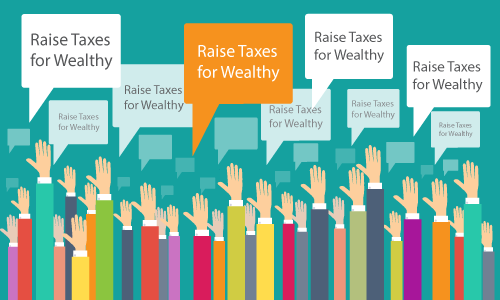Voters in Multiple States Choose Higher Taxes for the Wealthy

Of course, the big news from the election earlier this month was that Donald Trump shocked the world and defeated Hillary Clinton in the race to become the 45th president of the United States. However, there were several other important national, as well as local, election races and issues that were decided on November 8th. Not the least of which were several state measures aimed at raising taxes on high net worth individuals.
To that end, voters in both California and Maine decided that the rich needed to pay more taxes. In Maine, the vote to raise the state’s top tax rate from 7.15 percent to 10.15 percent was extremely close, passing by a narrow 50.4 percent to 49.6 percent margin. That means Maine will have the second highest top tax rate in the country in 2017, surpassing Oregon, which was number two in 2016 at 9.9 percent.
In California, meanwhile, the vote wasn’t even close, with 62 percent voting to extend temporary tax hikes already in place. Proposition 55 extended the hikes originally implemented in 2012 with Proposition 30. That means top earners, those who make $1 million or more a year, will continue to pay a tax rate of 13.3 percent at least until 2030. California will continue to have the highest tax rate for top earners in 2017.
So, while all signs point to Donald Trump lowering the federal tax rates, if you live in California or Maine and you’re a top earner, you won’t see any relief in the coming years in your state taxes.
http://www.forbes.com/sites/ashleaebeling/2016/11/10/voters-okay-state-income-tax-hikes-for-the-rich/#71480a7b16d0
Tax on Foreign Income of US Citizens or Residents
Tax on Foreign Income of US Citizens or Residents Foreign Earned Income Exclusion Individual US citizens and residents are taxed on their worldwide income. However, IRC Sec. 911 provides that qualified taxpayer can elect to exclude foreign earned income up to $87,600 from taxable income. (Read IRS Pub 54 for more details.) The qualifications are:…
IRS Eases Reporting Burden on Corporations and Shareholders
IRS Eases Reporting Burden on Corporations and Shareholders WASHINGTON — The Internal Revenue Service today announced new regulatory revisions that will reduce the reporting burden on corporations and shareholders while also making it easier for them to file their tax returns electronically. The announcement is part of an on-going effort by the IRS to remove…
How Is That Federal Tax Code Treating the Uber Rich?
How Is That Federal Tax Code Treating the Uber Rich? Earlier this year in his annual State of the Union Address, President Obama spent much of his speech discussing taxes. Specifically he talked greatly about the unfair tax system that favors the rich. If the president’s claims were to be believed, then you would think…
Tips to Help Taxpayers with January 30 Tax Season Opening
We thought it a good idea to share some tips to help taxpayers with the January, 30 tax season opening. The IRS will begin processing most individual income tax returns on Jan. 30 after updating forms and completing programming and testing of its processing systems. The IRS anticipated many of the tax law changes made…




